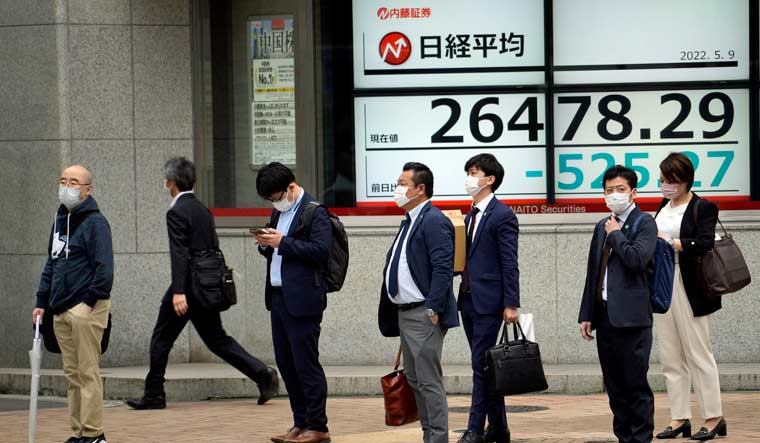Aian stocks followed Wall Street lower on Tuesday as fears increased that US rate increases to fight inflation might stall economic growth.
Market benchmarks in Tokyo, Hong Kong, South Korea and Australia fell. Shanghai advanced. Oil prices fell more than $ 1 but stayed above $ 100 per barrel.
Wall Street's benchmark S&P 500 index tumbled 3.2 per cent on Monday, hitting its lowest point in more than a year.
The Federal Reserve is trying to cool inflation that is running at a four-decade high, but investors worry that might trigger a US downturn. That adds to pressure from Russia's war on Ukraine and a Chinese slowdown.
Traders are pricing in the impending deterioration of economic conditions, said Yeap Jun Rong of IG in a report.
The Nikkei 225 in Tokyo lost 0.8 per cent to 26,117.76 and Hong Kong's Hang Seng dropped 2.8 per cent to 19,436.73.
The Shanghai Composite Index gained 0.2 per cent to 3,009.22 after the Chinese government announced rent cuts and other aid for small businesses in a new effort to boost anemic economic growth.
The Kospi in Seoul shed 0.7 per cent to 3,593.12 and Sydney's S&P-ASX 200 declined 1.2 per cent to 7,034.90.
India's Sensex opened up 0.1 per cent at 54,537.35. New Zealand and Southeast Asian markets retreated.
On Wall Street, the S&P 500 sank to 3,991.24. That leaves Wall Street's benchmark down 16.8 per cent from its January 3 record.
The Dow Jones Industrial Average fell 2 per cent to 32,245.70. The Nasdaq composite slid 4.3 per cent to 11,623.25 as tech stocks to the brunt of the selling.
Energy stocks also fell. Marathon Oil and APA Corp. each sank more than 14 per cent.
Stocks have declined as the Fed turns away from a strategy of pumping money into the financial system, which boosted prices.
The US central bank has raised its key rate from close to zero, where it sat for much of the coronavirus pandemic. Last week, it indicated it will double the size of future increases from its usual margin.
In energy markets, benchmark US crude sank $ 1.15 to $101.94 per barrel in electronic trading on the New York Mercantile Exchange. The contract plunged $6.68 to $ 103.09 on Monday. Brent crude, the price basis for international oil trading, lost $1.20 to $104.74 per barrel in London. It fell $6.45 the previous session to $105.94.
The dollar gained to 130.43 yen from Monday's 130.32 yen. The euro rose to $1.0576 from $1.0566.





